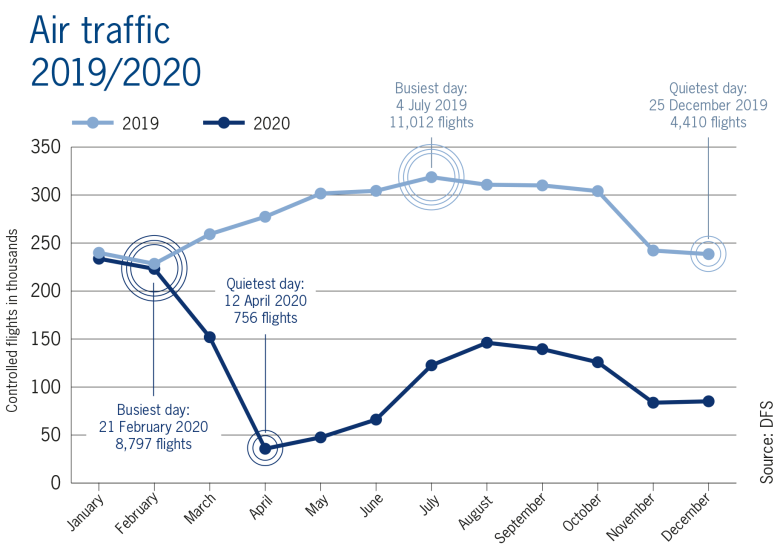
Even on its busiest day in 2020, DFS, the German air navigation service provider, logged only 8,797 flights. As a comparison, the busiest day in the prior year saw 11,012 flight being handled by DFS. A new record low was reached for the least busy day, with just 756 flights.
The 8,797 flight movements on the busiest day were recorded on 21 February 2020, according to figures taken from the Annual Summary 2020 published by DFS. This is an unusual time of the year for an annual peak. In previous years, traffic peaks had always occurred in the summer months. But since spring 2020, the effects of the COVID-19 pandemic have had aviation firmly in their grip. Only around 1.46 million flights were recorded in German airspace in 2020. This is 56.2 percent fewer than in the previous year, when 3.33 million aircraft movements were registered.
The negative record – the day with the lowest traffic volume – was achieved on 12 April, Easter Sunday. A mere 756 flights were handled by DFS controllers in the entire airspace of the Federal Republic of Germany on this day. To put this number into perspective, Düsseldorf Airport alone recorded that many aircraft movements on its peak day in 2019 (754 flights); Frankfurt Airport had twice as many (1,624 flights). On the quietest day of 2019, 25 December, DFS still logged 4,410 flights in German airspace. That was almost six times as many as at the low point in 2020.
"Despite these very low traffic volumes, air traffic control still has to remain fully functional as we are a piece of critical infrastructure," said Dirk Mahns, Chief Operating Officer at DFS. "You can't just close towers and airspaces. That's why we have to keep at least 60 percent of our air traffic control staff on the roster even when traffic is light."
Air traffic control is not just about getting holidaymakers or business travellers safely to their destinations. Air traffic control is also indispensable for the cross-border movement of goods and the distribution of vaccines around the world. "In this special pandemic situation, DFS also has a special responsibility to help with distributing vaccines," says Mahns. To maintain its services and protect its staff, DFS reacted early and put extensive occupational safety measures in place. "Our aim is to ensure that traffic in German airspace is handled safely and smoothly even in times of crisis."
Downloads
Media contact:
Kristina Kelek
Telephone +49 (0)6103) 707-4161
E-mail: presse@dfs.de
DFS Deutsche Flugsicherung GmbH, the German air navigation service provider, is a State-owned company under private law with 5,600 employees as at 31 December 2020. DFS ensures the safe and punctual flow of air traffic over Germany. Before 2020, around 2,200 air traffic controllers guided up to 10,000 flights in German airspace every day, more than 3 million movements every year. The company operates control centres in Langen, Bremen, Karlsruhe and Munich as well as control towers at the 16 designated international airports in Germany. The subsidiary DFS Aviation Services GmbH markets and sells products and services related to air navigation services, and provides air traffic control at nine regional airports in Germany and at London Gatwick Airport and Edinburgh Airport in the UK. R. Eisenschmidt GmbH is another DFS subsidiary which markets publications and products for General Aviation. Kaufbeuren ATM Training (KAT) is responsible for training military air traffic services personnel. DFS has been working on the integration of drones into air traffic since 2016 and has set up a joint venture, Droniq GmbH, with Deutsche Telekom.